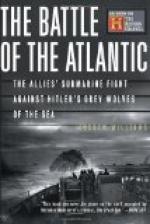We came about slowly, tossed a bit by the heavy swell, the ponderous boom swinging, and permitting the loosened canvas to flap against the ropes, until the sloop finally steadied onto the new tack. The distance to be covered was not great, and in less than ten minutes, we were drawing in toward the high stern of the anchored vessel. She was larger than I had thought, a lumping craft for those days, bark rigged, with lower spars the heaviest I had ever seen. No evidence of life appeared on board, although everything looked shipshape alow and aloft, and a rather extensive wash flapped in the wind forward, bespeaking a generous crew. There was no flag at the mizzen to signify nationality, yet there was a peculiar touch to the rig which confirmed in my mind the truth of Sanchez’s guess that she was originally Dutch. A moment later this supposition was confirmed as my eyes made out the name painted across the stern—NAMUR OF ROTTERDAM.
Fairfax leaned far out across the rail, as we swept in closer, his eyes searching the stranger’s side for some evidence of human presence aboard, but the Spaniard exhibited no particular interest in the proceedings, standing motionless, the smoke of the cheroot blown idly from his mouth, The fellow’s face was turned from me, yet I could not help note the insolence of his attitude, in spite of my occupation at the wheel. A hundred feet distant, I held the dancing sloop to mere steerage-way, while Fairfax hailed in a voice which went roaring across the water like a gun.
“Ahoy, the bark!”
A red-faced man with a black beard thrust his head up above the after rail, and answered, using English, yet with a faint accent which was not Dutch. What he looked like below the shoulders could not be discerned.
“Veil, vat’s vanted? Vos anyding wrong?”
“No, not aboard here,” returned Fairfax, a bit puzzled at the reply, “We ran down to see if you were in any trouble. This is a strange place to anchor. What are you—Dutch?”
The fellow waved his hands in a gesture indicating disgust. “Dat’s eet. Ve’re out ov Rotterdam—you see ze name ov ze sheep. But ve not sail frum thar dis time—no. Ve cum here from ze Barbadoes,” he explained brokenly “wiz cane-sugar, an’ hides. Ve vait here for our agent.”
“But why anchor in a place like this? Why not go on up to the wharfs?”
“Vye not? For ziz—I no trust my crew ashore. Zay Vest Indy niggers, an’ vud run avay ven ze chance cum. I know vat zay do.”
In spite of my efforts the two vessels were drifting rapidly apart, and this last explanation came to us over the water in a faint thread of sound barely discernible. I asked if I should tack back, but Fairfax shook his head, and in a moment more we were beyond reach of the voice. Dorothy appeared at the door of the cabin and stood there, gazing in surprise at the bark, while the moment he caught sight of her Sanchez went hastily forward, removing his hat with so peculiar a flourish as he approached as to cause me to notice the gesture. Fairfax remained beside the rail, staring out across the widening water, clearly dissatisfied, but finally waved his hand in a command to me to resume our course. Shortly after he crossed the deck to the wheel, and stood there beside me, still watchful of the dwindling vessel already far astern.




